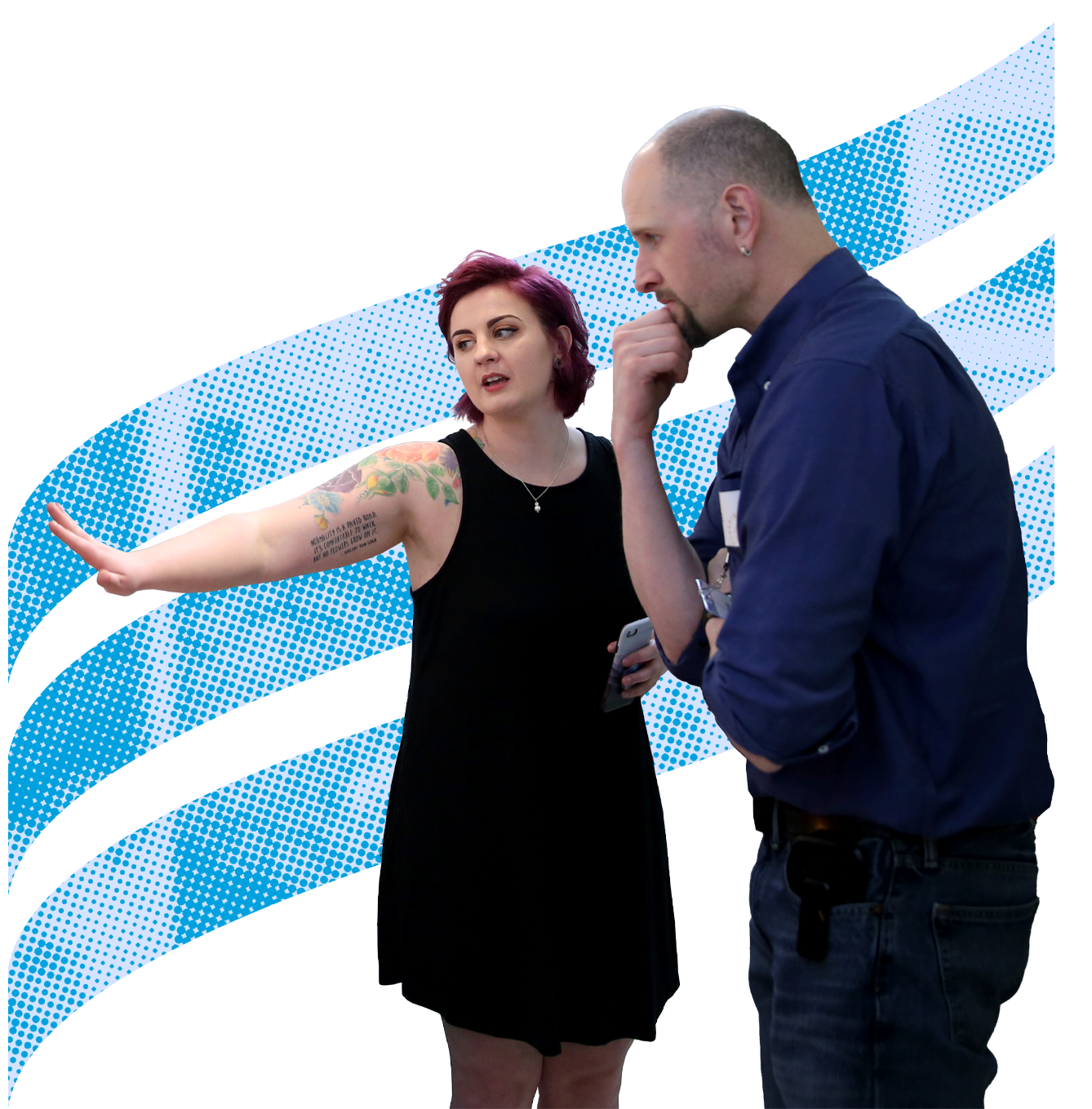
At UW-Stout, our Master of Fine Arts (M.F.A.) in Design is not just a degree—it's your canvas to lead, inspire, and instigate change. Blending practical problem-solving with a 'change the world' ethos, we elevate the traditional art school experience, crafting leaders who are as adept at teaching as they are at design. The M.F.A in Design is accredited by the National Association for Schools of Art and Design.
The M.F.A. in Design is regularly ranked by the Princeton Review as a Top Graduate Program for Game Design. In addition, students from the program frequently present their work in film festivals, exhibitions, competitions, and a variety of academic design conferences.

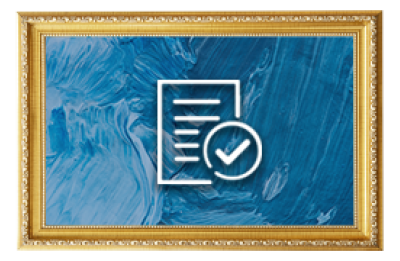

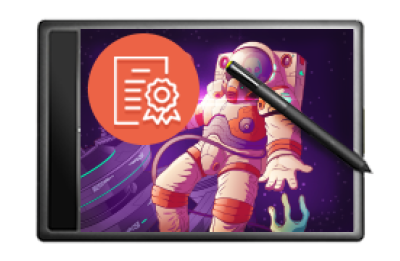
Our M.F.A. Design program utilizes a cross-disciplinary approach that allows you to blend your interests into a personalized education path. Our dedicated faculty work with you to weave course offerings and independent projects leveraging synergies among diverse disciplines.
Focus Areas

Designed for contemporary creatives, UW-Stout's M.F.A. in Design operates with a hybrid model, merging flexibility with academic foundation. Core classes are offered during the evenings with a combination of on-campus and online meetings. Students can opt for full-time, on-campus studio courses or customize a part-time plan with hybrid classes and independent projects. This program does not offer a fully online experience.
UW-Stout's School of Art & Design is accredited by the National Association for Schools of Art and Design.

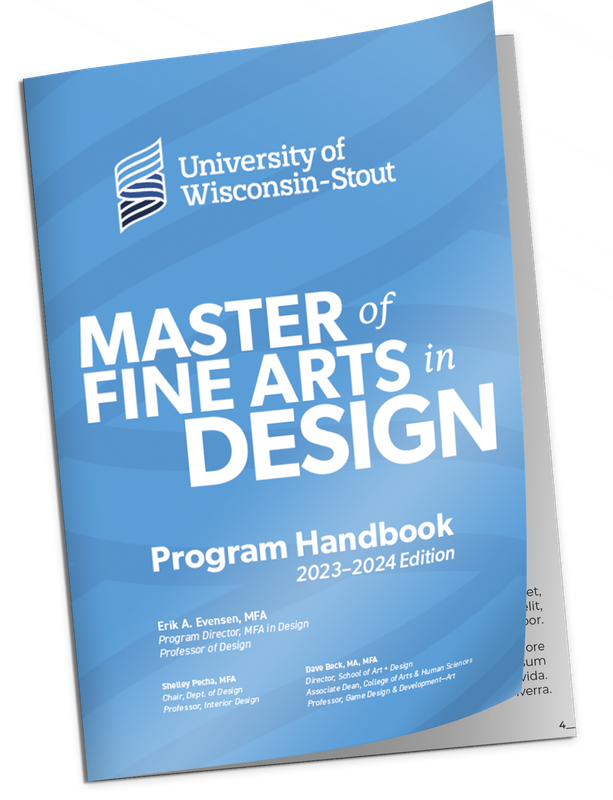
Our Master of Fine Arts in Design Program Handbook serves as an essential guide, encompassing a comprehensive overview of program structure, course offerings, and key academic policies. It's a valuable resource for students, offering insights and answers to facilitate their journey through the M.F.A. program.
Our M.F.A. program's core curriculum fosters an understanding of design principles through an immersive blend of historical insights, ethical frameworks, and sustainable practices. Our students engage in rigorous research strategies, critical analysis of design education, and a culminating creative thesis that together empower them to emerge as thought leaders in the design community.
View program plans, credit requirements, and course descriptions.
Enhance your knowledge, skills and career in critical areas related to design leadership. Whether you want to distinguish your education with specialized expertise or pursue a certificate before earning your master’s degree, the courses in these professional certificate and certification programs can be applied to the M.F.A. in Design’s elective requirements.
Vicon Motion Capture Lab
Photogrammetry Lab
Green Screen Studio
Recording Studios
Photography Studios
Editing Suites
Wacom Digital Drawing & Sculpting Labs
Game Design Central Studio
Gaming & Digital Innovation Lab
Digital Fabrication Lab
Traditional Process Lab
Furlong Gallery
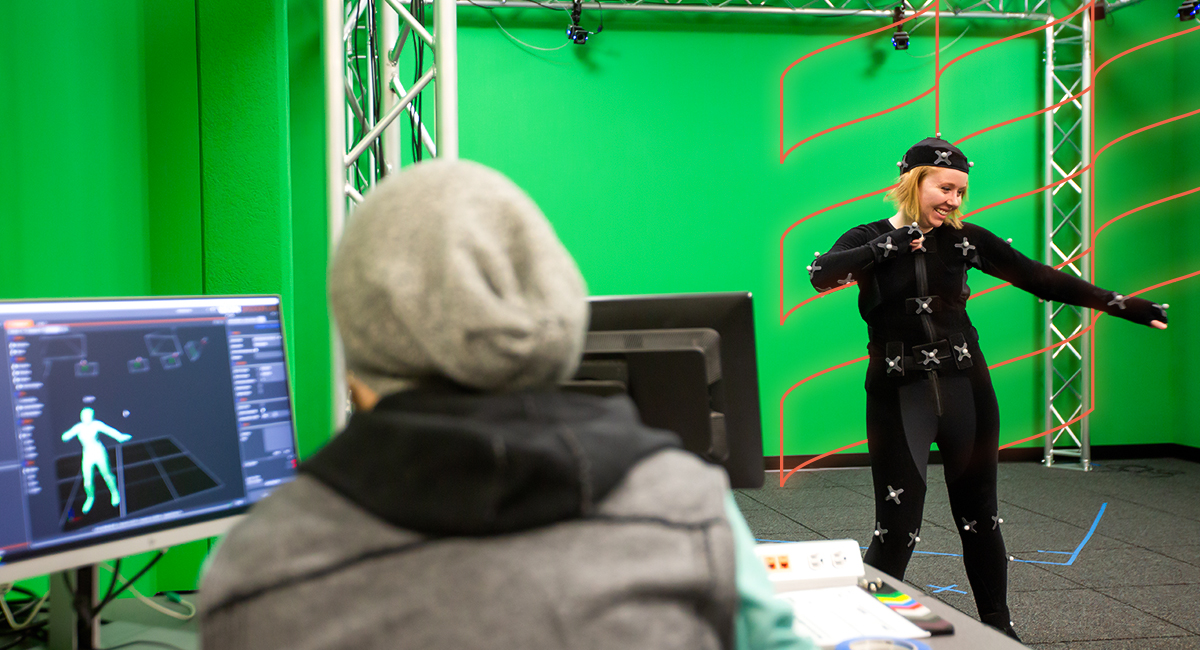
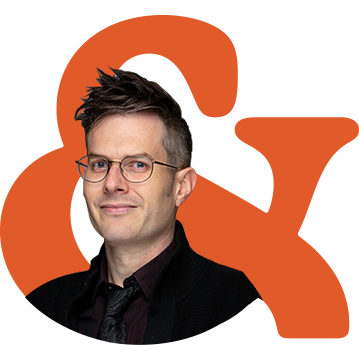
Program Director, M.F.A. Design
Professor, Department of Design
323C Applied Arts Building
Phone: 715-232-5324
Email: evensene@uwstout.edu
Shannen Jochim 312 Sorensen Hall
Phone: 715-232-2636
Email: domecqs@uwstout.edu
Julie E. Peterson, PhD
Professor of Interior Design
Courses: Ethics in Design, Research Strategies in Design
Robert Fraher, MFA
Professor of Graphic Design and Interactive Media
Courses: Design Seminar 2, Critical Issues in Design Education and Practice
Wendy Jedlicka, MIM
Senior Lecturer of Sustainable Design
Courses: Sustainable Design Practice, Sustainable Design II: Global Impact
James E. Bryan, PhD
Professor of Design History
Courses: History of Design Seminar
Dave Richter-O'Connell, MFA
Associate Professor of Industrial & Product Design
Courses: Sustainable Design Practice
Michael Heagle, MFA
Assistant Professor of Time-based Media
Courses: Creative Thesis in Design
Andrew Williams, PhD
Professor of Design History & Game Design
Courses: History of Design Seminar
Since our inaugural graduate in 2015, our MFA alumni have ascended as industry innovators, creative directors, and academic mentors, shaping the future of their respective fields. Their journey from Stout to success is a testament to the transformative education and hands-on experience that propels our graduates to excel and lead.

Andrew Murphy ('18)
Head of Strategic Projects
Apple
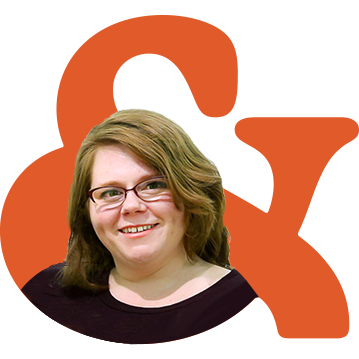
Michelle Mailey Noben ('17)
Senior Manager, User Experience
Grainger

Dharshana Gopalakrishnan ('18)
Designer
Wilkus Architects
"Playing with Heartbreak: Research and Development for a Game about Breaking Up"
Jackie Cummings ('22)
Game Design, Illustration & Storytelling
"Representation and Diversity in the Horror Genre: How Design Research can Inform the Creation of a Themed Lifestyle Publication"
Jessica Kromrie ('22)
Graphic Design, Art Direction, Cinema/Video
"Changing Design Aesthetic: Trends and Social Organizations of the Growing Toy Market for the Adult Collector"
Shane Sanders ('22)
Product Development, Toy Design, Entrepreneurship
"Out of the Darkness: Defining the Three Eras of Film Noir"
Drew Hagen ('21)
Cinema/Photography
"Designing the Future: Diegetic Sculpture & Literary Adaptation in Speculative Fiction Cinema"
Jonathan Wheeler ('21)
Cinema/Video
"Web-based Media for Asynchronous Communication Among International Students at the University of Wisconsin–Stout"
Liang Wu ('20)
Graphic Design & Interactive Media
"From vacant shopping malls to thriving senior living facilities"
Nicolette Brehm ('20)
Interior Design & Sustainability
"Sun of the Children"
Hue Vang ('18)
Game Design
"Forgotten Treasure: An Ode to the Omaha Train Depot in Menomonie"
Dharshana Gopalakrishnan ('18)
Interior Design & Sustainability
"No Parent Left Behind: A UX Research & Design Project"
Michelle Mailey Noben ('17)
Graphic Design & Interactive Media
“A Thread Through History: How Interlinking Contemporary Art with Paj Ntaub Can Connect Generations.”
Jackson Chufeng Yang ('23)
Graphic Design, Illustration & Storytelling


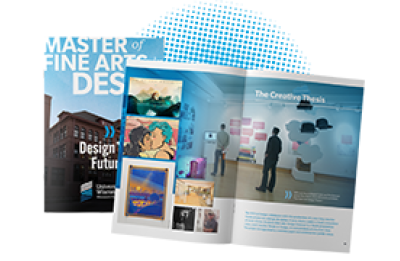
As a hybrid program, the M.F.A. in Design uses Customized Instruction tuition model.
Customized Instruction at UW Stout can be described as programs that are designed with the adult learner in mind. If you're comparing UW-Stout's customized instruction tuition to our competitors, keep in mind:
There’s more to value than just tuition. UW Stout also provides:
Other universities will present costs and value differently - make sure you're comparing apples to apples.
This is an example of a three-year course plan for a full-time student. This is not reflective of part-time study. Please review the Graduate Bulletin for the official program planner, credit requirements, and course descriptions. Please note that core courses are on a two-year rotation.
First Year (24 credits)
Fall Semester
DES-700 Design Seminar I (3 cr.) core
ARTH-720 History of Design Seminar (3 cr.) core
DES-XXX (3 cr.) focus area
Spring Semester
DES-730 Critical Issues in Design Education & Practice (3 cr.) core
DES-561 Transmedia Studio (3 cr.) focus area
Focus Elective (3 cr.)
Summer Term
DES-710 Ethics in Design (3 cr.) core
DES-750 Graduate Design Studio (3 cr.) focus area
Second Year (24 credits)
Fall Semester
DES-701 Visual Communication for Graduate Study (3 cr.) focus area
DES-800 Design Seminar 2 (3 cr.) core
Focus Elective (3 cr.)
Spring Semester
DES-524 Color Seminar (3 cr.) focus area
DES-712 Sustainable Design Practice (3 cr.) core
DES-725 Research Strategies in Design (3 cr.) core
Summer Term
DES-715 Sustainable Design II: Global Impact (3 cr.) focus area
DES-750 Graduate Design Studio (3 cr.) focus area
Third Year (12 credits)
Fall Semester
DES-870 Creative Thesis in Design (3 cr.) core
Focus Elective (3 cr.)
Spring Semester
DES-870 Creative Thesis in Design (3 cr.) core
DES-870 Creative Thesis in Design (3 cr.) core
All prospective graduate students at UW-Stout must follow a standard application process through our Graduate School. Beyond that, each graduate program has specific requirements that must be met to be successfully admitted to the program:
To apply to the M.F.A. Design program, you will need to submit additional application materials through our SlideRoom account:
10-15 examples of creative/professional work from your area(s) of expertise:
All work must be created by you, the applicant. Failure to follow this rule will result in immediate rejection. If your work is the result of a group project, highlight the role you played in its creation within the written description list.
This 2-3 page statement should describe your goals for graduate study, your topics of interest for research and exploration, and should provide context for your work included in the visual portfolio. PDF preferred.
PDF Preferred, and titled with your last name (i.e. Nelson_CurriculumVitae.pdf).
Three letters of reference from individuals who can speak to your abilities or potential as a designer, creative practitioner, and graduate student. PDF preferred.
All program application materials should be submitted digitally through SlideRoom.